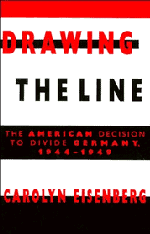Book contents
- Frontmatter
- Contents
- Preface and Acknowledgments
- Germany – Occupation Zones, 1945
- Introduction: Private Polowsky's Oath
- 1 Plans
- 2 Making Peace
- 3 The Limits of Reform: The U.S. Zone
- 4 A Fragile Friendship
- 5 The Russian Challenge
- 6 Bizonal Beginnings
- 7 The Doctors Deliberate
- 8 Marshall's Medicine
- 9 A Separate State
- 10 Cold War Germany
- 11 Winning
- Conclusion: The American Decision to Divide Germany
- Bibliography
- Index
11 - Winning
Published online by Cambridge University Press: 07 October 2009
- Frontmatter
- Contents
- Preface and Acknowledgments
- Germany – Occupation Zones, 1945
- Introduction: Private Polowsky's Oath
- 1 Plans
- 2 Making Peace
- 3 The Limits of Reform: The U.S. Zone
- 4 A Fragile Friendship
- 5 The Russian Challenge
- 6 Bizonal Beginnings
- 7 The Doctors Deliberate
- 8 Marshall's Medicine
- 9 A Separate State
- 10 Cold War Germany
- 11 Winning
- Conclusion: The American Decision to Divide Germany
- Bibliography
- Index
Summary
Secretary Acheson. The only other position you could take would be to say to the Russians, “You must withdraw your troops.” I think that is impossible. I do not see how we can say that the Russians must withdraw their troops without withdrawing ours, and it would be impossible and intolerable to think of withdrawing ours. …
(Hearings held in Executive Session of the Committee on Foreign Relations, United States Senate, May 19, 1949).… I still feel that some day we may pay bitterly for our present unconcern with getting the Russians out of the eastern zone.…
(George F. Kennan to Dean Acheson, May 20, 1949)As U.S. officials lost interest in settling the Berlin crisis, one of the casualties was an independent role for the United Nations. The Americans had initiated discussions in this forum, but were then surprised when foreign delegations took seriously the search for a diplomatic solution. In evading proposals for compromise, they weakened the organization's peacemaking function, while keeping intact their plans for a separate West German state.
However, as illustrated by the Berlin blockade, a divided Germany was not simply a symbol but also a stimulus to East–West confrontation. If West Germany was to be rebuilt and integrated into a bloc of Western nations, then the Soviets would have a permanent incentive to challenge the status quo. Under that condition, the West would need overwhelming military power both to prevent internal defections and to deter the Soviet Union. Although not originally Washington's intention, the formation of a new military alliance – the North Atlantic Treaty Organization (NATO) – became an integral part of their West German project.
- Type
- Chapter
- Information
- Drawing the LineThe American Decision to Divide Germany, 1944–1949, pp. 460 - 484Publisher: Cambridge University PressPrint publication year: 1996



